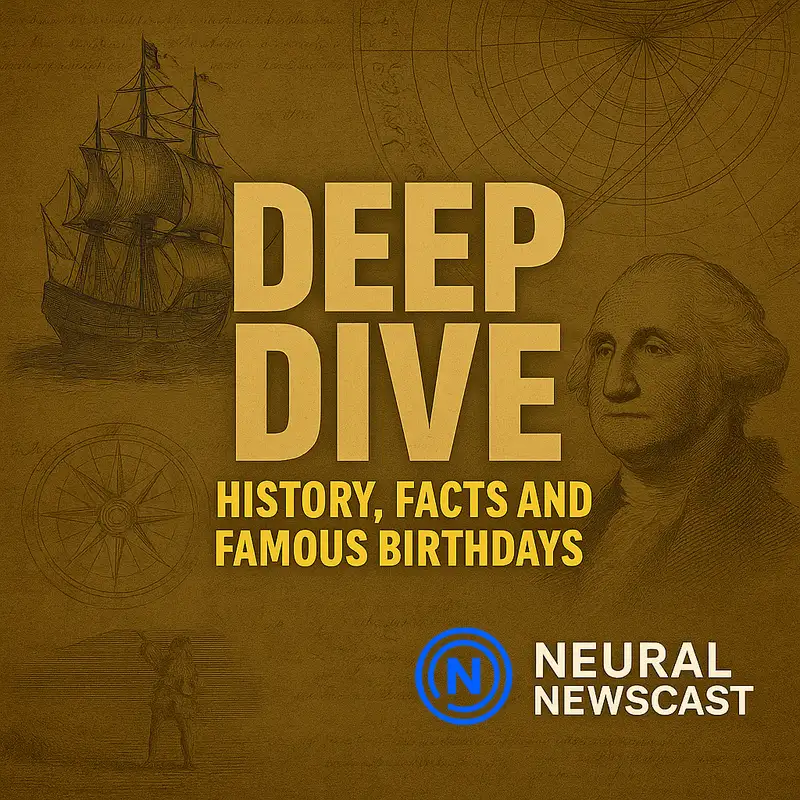Deep Dive: Founding Moments, Fiery Reformers, and the Pentagon’s Hidden Footprints - November 10, 2025
From AI-generated insights to human-reviewed accuracy, this is Neural Newscast, keeping you informed every day.
Thanks for joining us for this Neural Newscast deep dive.
I'm Lydia, your entertainment correspondent, and alongside Jessica, your travel reporter,
we're about to uncover some intriguing stories.
On this day in 1775, the United States Marine Corps was established by the Continental Congress in Philadelphia.
marking the birth of one of America's key military branches during the Revolutionary War era.
Being founded in Philadelphia, right in the thick of the Revolutionary War,
shows how urgent the moment was,
a practical move to bolster colonial defenses against the British.
From a cultural lens, it wasn't just paperwork.
It signaled an institution that would weave itself into American identity
and the way we tell stories about the revolution.
And if you picture Philadelphia then, streets buzzing with debate and organization,
you feel the texture of the place where that pivotal decision took shape.
That birth also shaped how people later imagined joint military and naval cooperation.
how it would be perceived and dramatized in narratives and ceremonies.
But first and foremost, it had an immediate boots-on-the-ground purpose.
It wasn't symbolic. It answered wartime pressure.
Amazing how a single vote by the Continental Congress in Philadelphia ripples
through military structure and public perception for centuries.
It anchors a lasting institution to a specific place and time.
Philadelphia, 1775, a touchstone origin.
As origin stories go, it blends political necessity with a legacy that culture continues to commemorate.
In short, the Continental Congress creates the Marine Corps in Philadelphia in 1775,
under revolutionary war pressure against the British, and the impact endures.
Time for a quick pause.
We'll explore more when Neural Newscast deep dive returns.
Today we celebrate the birthdays of Martin Luther, 1483,
Friedrich Schiller, 1759, and Ennio Morricone, 1928.
Martin Luther, now that's someone whose life rippled far beyond theology, right?
Absolutely.
Luther was the fiery theologian and reformer who sparked the Protestant Reformation in 1517
by nailing his 95 Theses to the church door in Wittenberg.
That image alone feels cinematic.
One man, a door, and a world shifting.
It changed religious practice, sure, but also social and political structures.
Exactly.
His courageous stand against corruption in the Catholic Church reshaped Christianity
and helped lay groundwork for ideas about individual freedom and modern democracy.
Which is fascinating because as a travel reporter,
I always think about how beliefs shape places.
Luther's reforms influenced everything from church architecture to civic life across Europe.
He wasn't just a protester.
His ideas about conscience and the authority of Scripture challenged centuries of centralized religious power,
influencing legal and political thinking.
And those ripples created entirely new cultural landscapes, towns, universities, and communities,
reoriented around different ideas of worship and governance.
There are some vivid lesser-known angles too, like how his pamphlets spread so effectively
because of the printing press, making him an early master of mass communication.
Right.
The synergy between his message and technology of the time is striking, like an early case of ideas meeting the right medium.
And that combination helped ideas about individual conscience and reform travel fast.
Essential when you're reshaping not just religion but daily life and power balances.
It also set the stage for thinkers and artists to wrestle with freedom and individuality,
speaks to why Schiller and even later cultural figures found fertile ground in that climate.
Speaking of Schiller and Moricone, their presences on this list underscore
how different kinds of creativity and descent can transform culture.
Words, music, doctrine.
It's a neat trio, Luther's reforms, Schiller's dramatic explorations of freedom, and Morikoni's
emotional scores all reshaping how people feel and think.
Looking back, Martin Luther's bold act in Vittenberg wasn't just a religious protest.
It helped catalyze movements toward personal rights and public debate.
Legacy that still matters when we talk about justice and reform today.
And that's why remembering his birthday feels relevant.
His life is a reminder of how a single, principled stand can alter the course of history.
Time for a quick pause.
We'll explore more when Neural Newscast deep dive returns.
You're listening to Neural Newscast.
Fresh insights every day.
Catch up on past episodes anytime at nnewscast.com.
Welcome back to Neural Newscast Deep Dive.
Let's continue our exploration.
The Pentagon in Arlington, Virginia has twice as many bathrooms as is necessary,
because when it was built in the 1940s,
the state of Virginia still had segregation laws requiring separate toilet facilities for blacks and whites.
That's striking.
That's striking.
Twice as many bathrooms built into such a monumental building
directly because Virginia's laws at the time
required separate toilet facilities for blacks and whites.
It turns the building itself into a physical record of those segregation laws.
You can feel the imprint of policy on architecture, right?
Absolutely, and as someone who thinks about places and how they shape experience,
It's a reminder that even practical things like restrooms can carry the weight of social systems.
For a lead entertainment correspondent, it's also a vivid narrative.
Places we think of as purely functional or symbolic often hold these unexpected human stories baked into their design.
And for travelers, it's the sort of detail that reframes a visit.
You're not just looking at corridors and offices.
You're walking through histories shaped by Virginia's laws in the 1940s.
The fact that there are literally double the bathrooms forces you to confront how segregation was normalized in infrastructure,
not just in social policy.
It also makes you think about legacy, how long physical traces of discriminatory laws can persist, even after the laws themselves are gone.
Exactly.
Architectural choices echo across decades, and the Pentagon's extra bathrooms are a clear, tangible example of that echo.
It's a sobering piece of context for one of the nation's most iconic buildings,
and it changes the way you mentally map that space.
And it shows how history can be read in unexpected places.
Sometimes the built environment tells the story more plainly than words.
Right, and noticing that story matters, because recognizing these details
is part of understanding the full history of a place.
That's all for this Neural Newscast deep dive.
On behalf of Lydia and myself, Jessica, thanks for listening.
From daily summaries to deep storytelling, Neural Newscast keeps you informed.
Visit NeuralNewscast.com for more ways to listen and explore.
At Neural Newscast, we mix real voices with AI-generated ones to bring you fast, high-quality news.
Every story is created with AI but reviewed by humans to keep things accurate and fair.
While we do our best to prevent mistakes, AI isn't perfect.
So double-check key facts with trusted sources.
Want to know more about our AI process?
Head to endnewscast.com.
Creators and Guests


